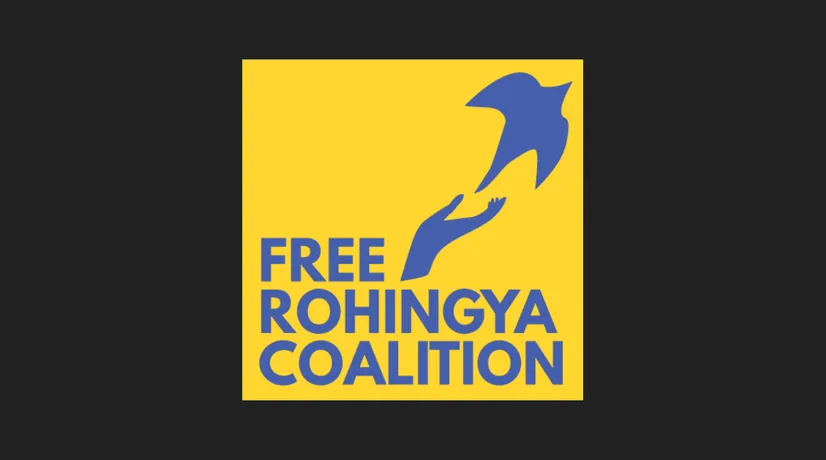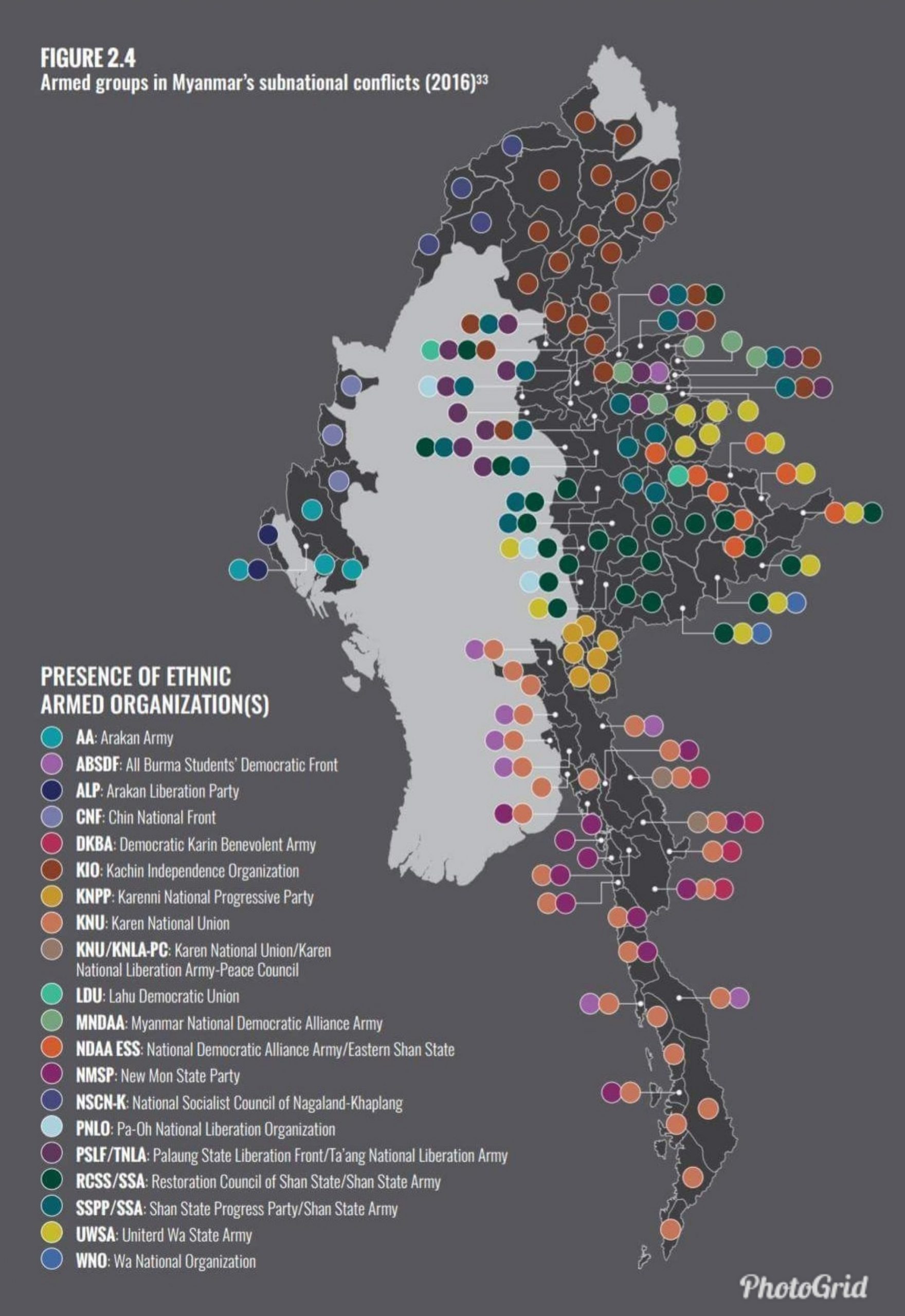Free Rohingya Coalition is Alarmed by Genocide Denial Made by Aung San Suu Kyi’s Independent Commission of Enquiry
21 January 2020
Free Rohingya Coalition

The Free Rohingya Coalition refutes the findings of Myanmar’s Independent Commission of Enquiry that there is “no” or “insufficient” evidence to establish the genocidal intent behind Myanmar’s destruction of the Rohingya community in Myanmar and the mass deportations of estimated 800,000 Rohingyas into Bangladesh in 2016 and 2017.
Nay San Lwin, the co-founder and coordinator of the Coalition, said, “this is yet another Myanmar commission set up to deny and dismiss credible findings of the decades-long and ongoing genocide of our Rohingya people. The Commission has not established facts, but merely handed over a thick pack of lies, distortions and denial for Myanmar’s use at various international tribunals.”
Despite it being billed as “independent” (from the political interference) by State Counsellor Aung San Suu Kyi, the report echoes the line of defence which was offered by Suu Kyi, in her capacity as Myanmar Agent, and her legal counsels, in The Gambia vs Myanmar case at the International Court of Justice (ICJ) on 11 and 12 December last year. Both the Commission’s report and legal counsels argued that Myanmar security forces may have used “disproportionate” force, committed war crimes and other human rights violations, but that there were no acts of genocide. These findings play into the hands of the perpetrators who are fully aware that prosecuting them for war crimes and crimes against humanity will not fall within the jurisdiction of the court. For ICJ, the United Nations’ highest court, handles only legal disputes among UN member states and does not prosecute individual state leaders and officials.
The report’s admission of Myanmar’s wrongdoing – that war crimes, serious human rights violations, and breaking of domestic law took place during the security operations between 25 August and 5 September 2017 – merely reiterates Myanmar’s legal argument. By weighing in on the ICJ case, the report had also contradicted the statement previously made by the Commission Chair Rosario Manalo, a veteran diplomat from the Philippines, in which she claimed that her commission was not concerned with accountability. In her words, “it is not a diplomatic approach…to be doing finger-pointing, blaming – to say ‘you’re accountable.’
In addition, the Free Rohingya Coalition disputes the credibility and reliability of the claim by the Commission that there was no “pattern of conduct from which one could reasonably conclude that the acts were committed with ‘genocidal intent.” It claimed to have covered “the context and historical background of Rakhine State.” Yet legal and human rights research studies that have covered the same context and historical background of Rohingyas of Rakhine have reached the conclusion that Myanmar has a well-documented policy of discrimination, disenfranchisement, persecution and violence against the Rohingya as a group, with its own distinct identity, culture, language and faith over the last 40-years.
Among the institutions that have published studies which document and establish this pattern of Myanmar’s systematic and identity-based group destruction of Rohingyas, a UN-protected group, are the University of Washington Law School (2014), Queen Mary University of London international State Crime Initiative (2015), Yale University Lowenstein International Human Rights Law Clinic (2015) and the United States Holocaust Memorial Museum (2017). Independent of one another, these credible research institutions have established the common finding – that Myanmar has adopted a policy of genocidal destruction against Rohingyas as a group. The United Nations-mandated International Independent Fact-Finding Mission and its two major reports of 2018 and 2019 have only reinforced the findings of the afore-mentioned legal, human rights and genocide studies.
The patterns of Rohingya persecution include the de-nationalization of Rohingya as a national minority, forced labour, chronic deportation campaigns, ghettoization, denial of life’s essential services such as access to primary and emergency medical services, severely restrictive marriage and birth control measures, summary execution, widespread sexual violence, internment, mass incarceration, severe restriction of movement, and the state-directed propaganda campaign that Rohingyas do not exist despite the official and historic documents to the contrary.
Finally, Suu Kyi’s Independent Commission of Enquiry framed mass deportation, mass deaths and mass destruction of Rohingyas as the result of “disproportionate use of force” in response to the “internal armed conflict” between the then-fledgling Arakan Rohingya Salvation Army and Myanmar Armed Forces and Police, without the intent to destroy the Rohingya community, in whole or in part.

Source: Asia Foundation
Myanmar is a country born out of the World War II and is home to the world’s longest armed conflicts between the ethnically Burmese governments and their central military and virtually all national minorities. There are altogether over 20 armed ethnic organizations, which have sprung up since independence from Britain in 1948 throughout all regions of national minorities. Myanmar has not subjected other ethnic groups, no matter how fierce the armed conflicts are, to the kind of persecution and destruction comparable to what it has against Rohingyas.
In a single year of 2019, the Arakan Army (AA) of Rakhine Buddhists has fought 600 battles with Myanmar security forces and claimed to have killed 3,000 Myanmar army and police personnel, something which Myanmar Ministry of Defence has not denied. Pro-AA Buddhist Rakhine communities have not been subjected to the same systematic group destruction. In contrast, the poorly armed Arakan Rohingya Salvation Army managed to kill only 12 Myanmar security personnel in its 30 raids – never independently verified – at Myanmar military and police outposts between 25 August and 5 September 2017.
Myanmar’s immediate reaction resulted in the genocidal purge of three quarters of a million Rohingyas of whom estimated 300,000 are school-aged children and young adults; the total destruction of 390 Rohingya villages, complete with 38,000 physical infrastructures including mosques, shops, homes, rice warehouses, public halls and so on; the deaths of an unknown and uncounted Rohingya deaths believed to run into the tens of thousands including babies, toddlers and elderly villagers; and the rape of thousands of women.
Backgrounder:
In the midst of mounting worldwide allegations of Myanmar’s ongoing genocide against Rohingya people, the country’s President Win Myint, who serves as Ms Suu Kyi’s proxy, established the Independent Commission of Enquiry on 30 July 2018. It is chaired by Ms Rosario Manalo, former Deputy Foreign Minister of the Philippines, and made up of 3 additional commissioners, including Mr Mya Theinn (former Director General of the Supreme Court of Myanmar), Mr Aung Tun Thet (former Director General in the Myanmar Ministry of Health and Business Administration expert) and Mr Kenzo Oshima, (former Japanese Ambassador to the United Nations and ex-Senior Vice-President of Japan International Cooperation Agency). Both Japan and the Philippines have consistently voted against annual United Nations resolutions on Myanmar condemning the Asian pariah for its grave crimes in international law and calling for international accountability. In addition, the Burmese Commissioner Aung Tun Thet is a highly controversial Chairman of the Union Enterprise for Humanitarian Assistance, Resettlement and Development in Rakhine (UEHRD), Myanmar government entity established by Ms Suu Kyi. The United Nations investigators have accused UEHRD of consolidating the “consequences of war crimes” as it confiscates vast tracts of land that belonged to Rohingya people who had been genocidally purged in 2016 and 2017, builds infrastructures on that land and primes its for commercial and industrial-scale agricultural developments.
Media Contact:
Nay San Lwin – Coordinator for Media Relations – +49 176 62139138
Maung Zarni – Coordinator for Strategic Affairs – +44 771 047 3322
E-mail: [email protected]
၎
င
၎
၎
၎
င
၎
၎
Announcements
04 April 2025
Myanmar: Human Rights Council condemns the junta, responds to the earthquake, and calls to end sale and supply of arms and jet fuel
13 March 2025
Job Vacancy: Administrative and Finance Assistant
28 February 2025
Open letter: Removal of the membership of the dis-accredited Myanmar National Human Rights Commission from the Southeast Asia National Human Rights Institution Forum
25 February 2025
သတင်းထုတ်ပြန်ကြေညာချက် – တရားမျှတမှုဆီရှေးရှုလျက် အာဂျင်တီးနားတရားရုံး၏ ဖမ်းဝရမ်းထုတ်ပြန်မှုကို ကြိုဆိုထောက်ခံ
25 February 2025
Press Statement: Argentine Court’s arrest warrants are welcome progress towards justice

Progressive Voice is a participatory rights-based policy research and advocacy organization rooted in civil society, that maintains strong networks and relationships with grassroots organizations and community-based organizations throughout Myanmar. It acts as a bridge to the international community and international policymakers by amplifying voices from the ground, and advocating for a rights-based policy narrative.